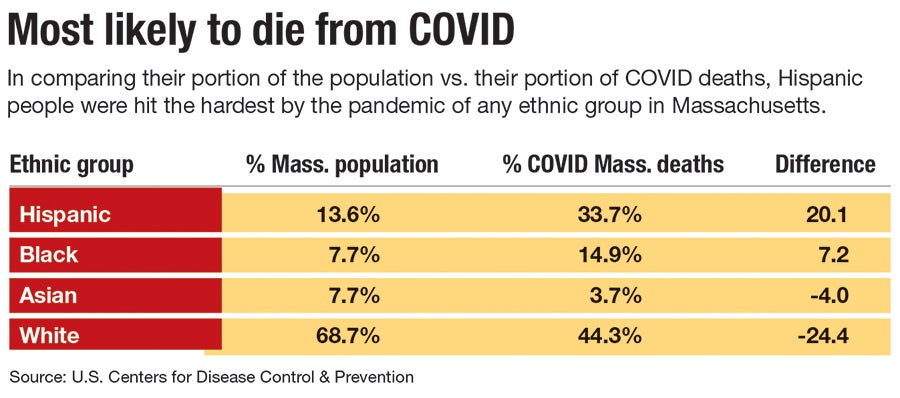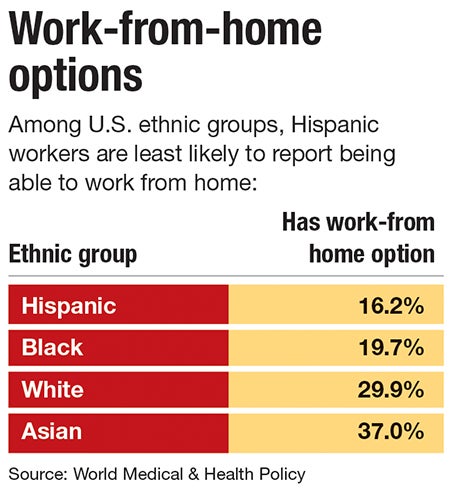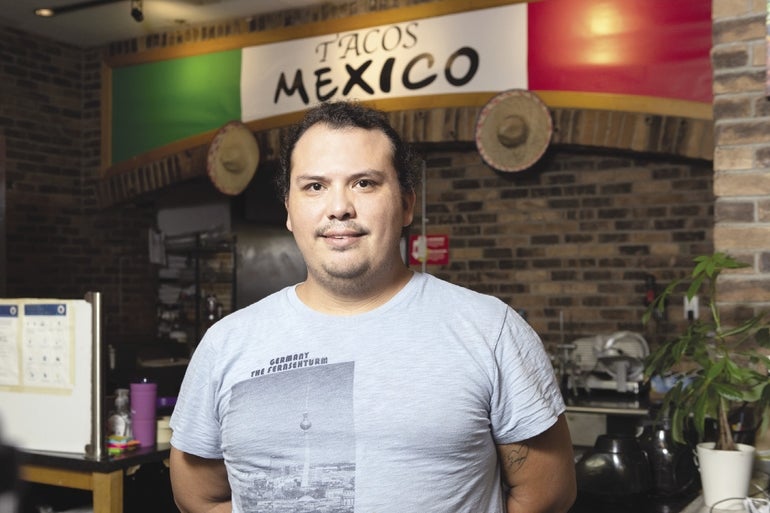Latino business and community leaders are working together to plan a celebration focused on highlighting the coronavirus pandemic’s impact on Latinos.
Get Instant Access to This Article
Subscribe to Worcester Business Journal and get immediate access to all of our subscriber-only content and much more.
- Critical Central Massachusetts business news updated daily.
- Immediate access to all subscriber-only content on our website.
- Bi-weekly print or digital editions of our award-winning publication.
- Special bonus issues like the WBJ Book of Lists.
- Exclusive ticket prize draws for our in-person events.
Click here to purchase a paywall bypass link for this article.
As Worcester businesses persist in their efforts to return to normal following the coronavirus pandemic, members of its Latino community are asking Worcester to reflect on the disproportionate losses felt by people of color in the city.

“It’s disconcerting as we move forward to where people think we’re post-pandemic when we haven’t addressed these root causes that cause some people in our community to be more affected than others,” said Gina Plata-Nino, an attorney at Worcester nonprofit Community Legal Aid and a leader in the pandemic response effort Worcester Together coalition.
In numbers reflected nationally and locally, the Latino community, which makes up 22% of Worcester’s population, saw disproportionately higher rates of COVID-19, greater barriers to accessing the vaccine, and larger percentages of business closures throughout the pandemic.
Now, Plata-Nino and other Latino business and community leaders are working together to plan a celebration around the traditional Mexican holiday Día de los Muertos – or, Day of the Dead – observed on the first two days of November, which commemorates loved ones who have passed away.
This year, Worcester’s celebration, which will include a variety of events and a mural in City Hall, is particularly focused on highlighting the coronavirus pandemic’s impact on Latinos.

Challenges for Latino-owned businesses
Health disparities are typically impacted by social determinants, such as access to housing, food security, education, and a multitude of other factors, said Germán Chiriboga, program director of health equity and storytelling research at UMass Chan Medical School in Worcester.
“When you look at the economic side of the disparities during COVID, everything goes back to access to wealth and wealth distribution in the city,” Chiriboga said. “Latinos historically here in the city, and also African Americans, [are] two of the groups that have been underserved in terms of access to opportunity.”
In spring of 2020, 32% of Latino-owned small businesses nationally closed their doors, nearly twice the amount of white-owned small businesses that closed, according to the Cambridge-based National Bureau of Economic Research.
“I’ve seen a lot of Latinos lose businesses because of COVID,” said José Zuniga, who has owned Tacos Mexico in Auburn for almost seven years. “We didn’t know what was going to happen or if we were going to be able to open again.”
Gaps in resource accessibility for Latino business owners has been a major cause of these disparities, said Plata-Nino.
“There’s so many layers,” she said, mentioning childcare, internet access, and language barriers as just a few examples.
A vast majority of Central Massachusetts business owners who received federal Paycheck Protection Program payouts from the U.S. Small Business Administration were white, with about 5.7% of the awardees identifying as Hispanic, according to WBJ’s research in the SBA data. PPP was a $669-billion effort created by Congress in March 2020 to provide forgivable loans to businesses who kept their employees employed.
Zuniga said he missed the first round of PPP loan applications, but received money in the second round.
“I was very confused at the beginning. I tried to apply but by the time I applied the deadlines were already done,” he said.
When compared on a state level, Worcester’s business sector isn’t the most friendly toward Latinos, Chiriboga said. He referenced the example of Polar Park, a project in which less than 1% of its $100 million of construction contracts went to minority-owned businesses, according to an investigation from Boston media outlet GBH, which has a Worcester bureau.
Along with facing inadequate support, a higher proportion of Latino workers ended up on the frontline during the pandemic, making it harder to isolate safely. Some of the most common industries for Latino workers include construction, leisure and hospitality, transportation, and retail, according to the U.S. Bureau of Labor Statistics.
“When you look at Latino and other minority workers, they were mostly affected because they’re overrepresented in industries hit hardest by social distancing orders when they first came about,” said Plata-Nino.
This led to a greater number of Latinos in Worcester being infected with COVID-19 earlier in the pandemic, when much was still unknown about the disease and treatment options were limited. Worcester’s population is roughly 22% Latino, but Latinos made up 31% of the COVID-positive population in July 2020, which was the highest rate among all racial and ethnic groups in the city, according to data from UMass Memorial Health in Worcester.
Latinos then experienced greater barriers to accessing the COVID vaccine when it came out. In April, the state reported 24% of Worcester’s Latino population had received one dose of the vaccine, compared with 49% of the white population.

Inspiring change
“This event should be a way to bring some attention to the disparities that aren’t necessarily very widely understood and remember the people who were lost to COVID, all while introducing the community to this beautiful cultural celebration,” said Valerie Zolezzi-Wyndham, founder and owner of Promoting Good, LLC in Upton, and an instrumental organizer of the Day of the Dead event in Worcester.
Day of the Dead celebrations typically feature ofrendas, or offerings, which include photographs of lost loved ones, along with food, flowers, and candles.
Plata-Nino said the celebration is not only an important moment to mourn and celebrate the lives of those who have passed away, but also to inspire change.
“Putting a face and a name to these numbers is important for us moving toward the proper health public policy,” she said.
While it’s meant to be an engaging celebration of Latino culture, Chiriboga said the undertone of the event is to draw attention to the need for more equitable leadership and resource distribution in the city.
“We’re a little more than a quarter of the city, and yet are not fully integrated and [are] just not quite at the table when it comes to decision-making,” he said, referring specifically to the civic and government discussions about what to do with the $111-million allocation Worcester received from the American Rescue Plan Act, which was passed by Congress in March to help – among other things – communities fund critical needs.

